'Real' All-Stars, Quick's resurgence, Fantilli rolling, and 3 other NHL items
In the NHL universe, there are two sets of All-Stars.
There's the midseason All-Stars - the 44 players picked to participate in All-Star Weekend, set this year for Feb. 1-3 in Toronto. One representative for each team is chosen by the league. Another 12 players are voted in by fans.
Then there are the lesser-known end-of-season accolades for the 12 players chosen as first- or second-team All-Stars by members of the Professional Hockey Writers Association. Each "team" in this case includes one center, one left wing, one right wing, two defensemen (any handedness), and one goalie.
Plenty has been written over the past few days about the first set of All-Stars, including this analysis of the 12 vote-in spots by my colleagues Josh Wegman and Sean O'Leary. So let's instead focus on the second set.
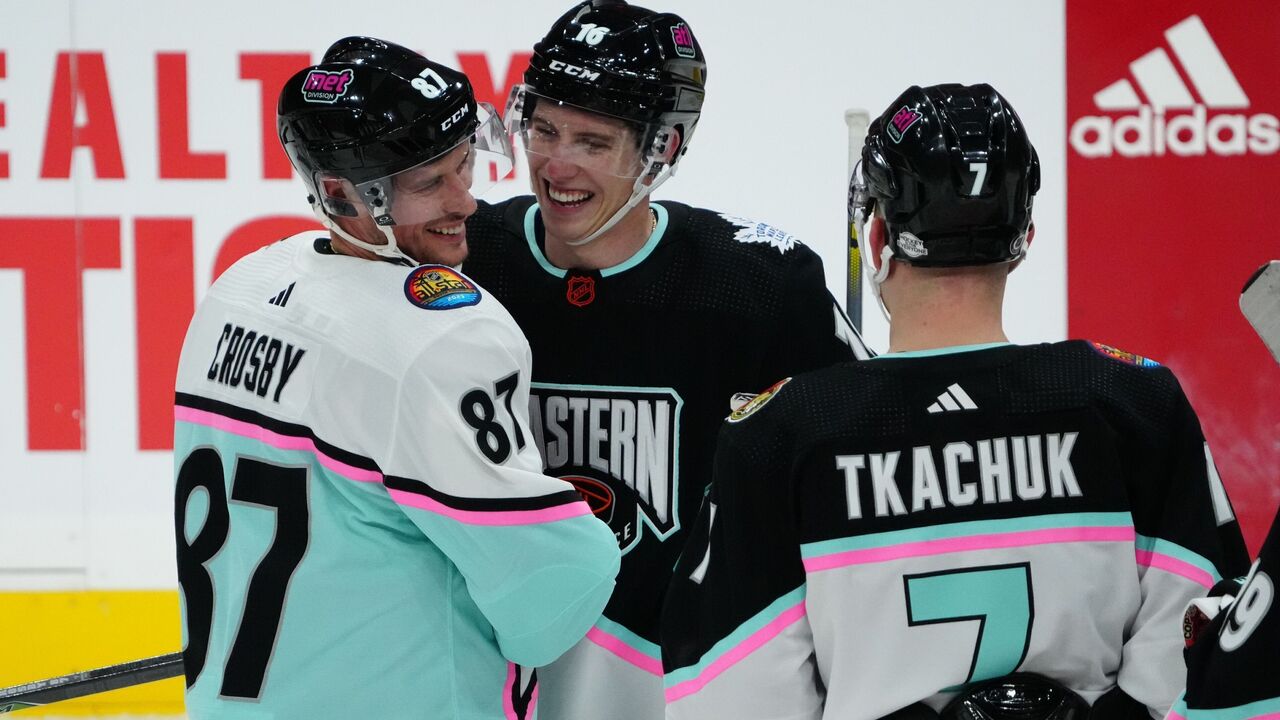 Brian Babineau / Getty Images
Brian Babineau / Getty ImagesThe selection process for the first set of All-Stars is inclusive and done with entertainment in mind. It's for fun. The second set, which is unveiled during the annual awards ceremony, is exclusive, formal, and very much real in the sense that the results can impact a player's Hockey Hall of Fame candidacy.
Using the positional designations listed on NHL.com, here's who I'd slot into the NHL's First Team and Second Team spots if votes were due this week:
Center: MacKinnon, who's been on a tear for months, is a Hart Trophy favorite. McDavid's second in points (53) among centers despite appearing in just 33 games. I strongly considered Sidney Crosby, Auston Matthews, and Jack Hughes for Second Team, but none of them have been quite as outstanding as McDavid. (Gun to my head, Crosby's third.) Props to Elias Pettersson, J.T. Miller, and Aleksander Barkov for two-way brilliance. As usual, the position is rich in superstar talent.
Left wing: Panarin was the obvious choice for First Team. I picked Forsberg over Jesper Bratt, Zach Hyman, and Jake Guentzel because the Swede has posted similar numbers with a bit less dynamic talent around him in Nashville.
Right wing: Kucherov was easily the First guy, whereas Pastrnak had a serious challenger in William Nylander. In the end, the degree to which Pastrnak powers Boston's offense (18 points clear of Brad Marchand, his linemate and the Bruins' second-highest scorer) gave him the edge. If I were to fill five teams, I'd go Nylander 3; Mikko Rantanen 4; Brock Boeser 5.
Defensemen: Hughes is a Hart candidate, and Makar has been fantastic, so finalizing the First Team wasn't difficult. For Second, Dobson was a no-brainer, while I debated between Morrissey, Rasmus Dahlin, and Evan Bouchard for the last spot. What tipped the scales: Winnipeg's outscored the opposition 40-18 (!) at five-on-five when Morrissey's been on the ice.
Goalie: Similar to the defensemen, two goalies were a cut above the rest. Since Hellebuyck's underlying numbers are slightly better than Demko's, I gave him the First spot. Other starting netminders worthy of a shoutout here: Connor Ingram, Cam Talbot, and Ilya Sorokin. And, of course, props to the two-headed beast that is Jeremy Swayman and Linus Ullmark in Boston.
What's behind Quick's resurgence?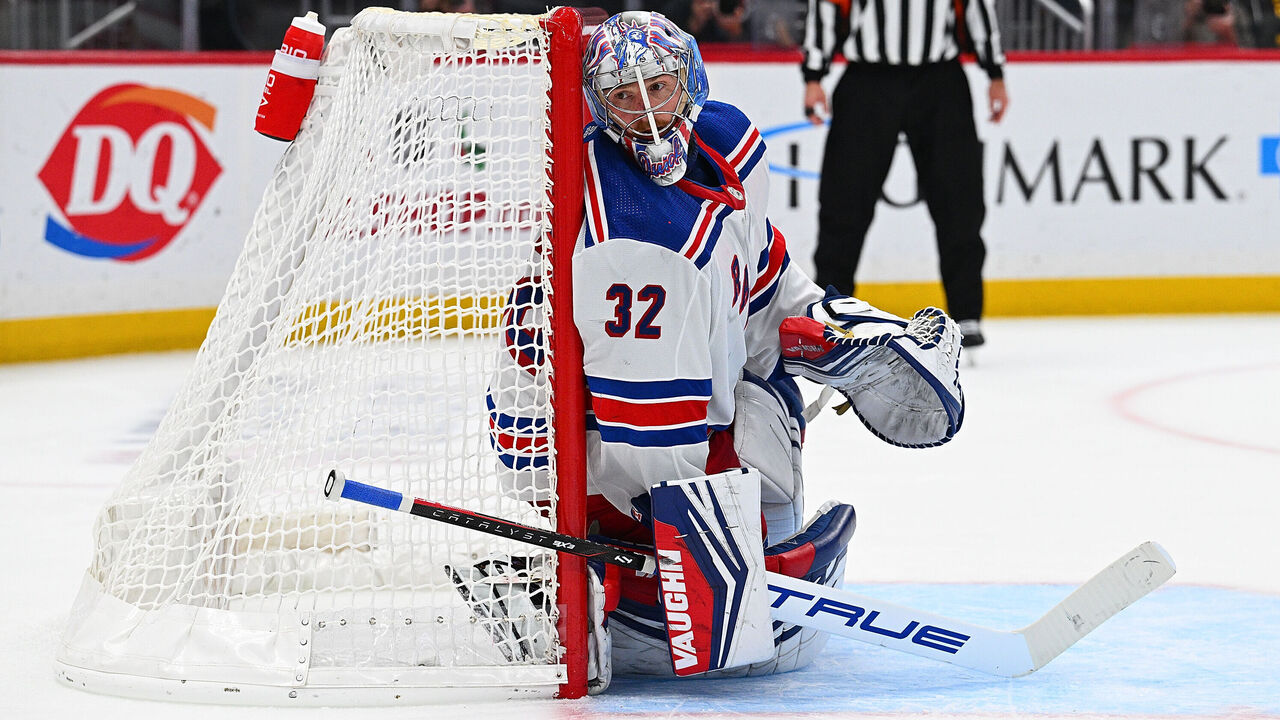 Justin Berl / Getty Images
Justin Berl / Getty ImagesJonathan Quick had nothing to prove coming into this season.
He was a three-time Stanley Cup champion who won twice as the starter in L.A. and once as the backup in Vegas. He was named playoff MVP in 2012. He finished in the top five in Vezina Trophy voting three times. He revolutionized the position by popularizing the reverse vertical horizontal, or RVH, post-play technique.
After signing a one-year, $825,000 deal (plus bonuses) with the Rangers this past offseason, he was expected to be Igor Shesterkin's mentor and not much more. After all, he turns 38 later this month and will be skating off into the sunset sooner rather than later.
Instead, Quick has flourished in New York. He owns a .917 save percentage and has saved 0.61 goals above expected per 60 minutes of action, according to Sportlogiq. How good are those marks in today's offense-first NHL? Among the 54 goalies who've logged 700 or more minutes, Quick is tied for 10th in SV% and ranks seventh in GSAE/60.
The No. 1 reason behind Quick's resurgence: his health. No. 2: his positioning.
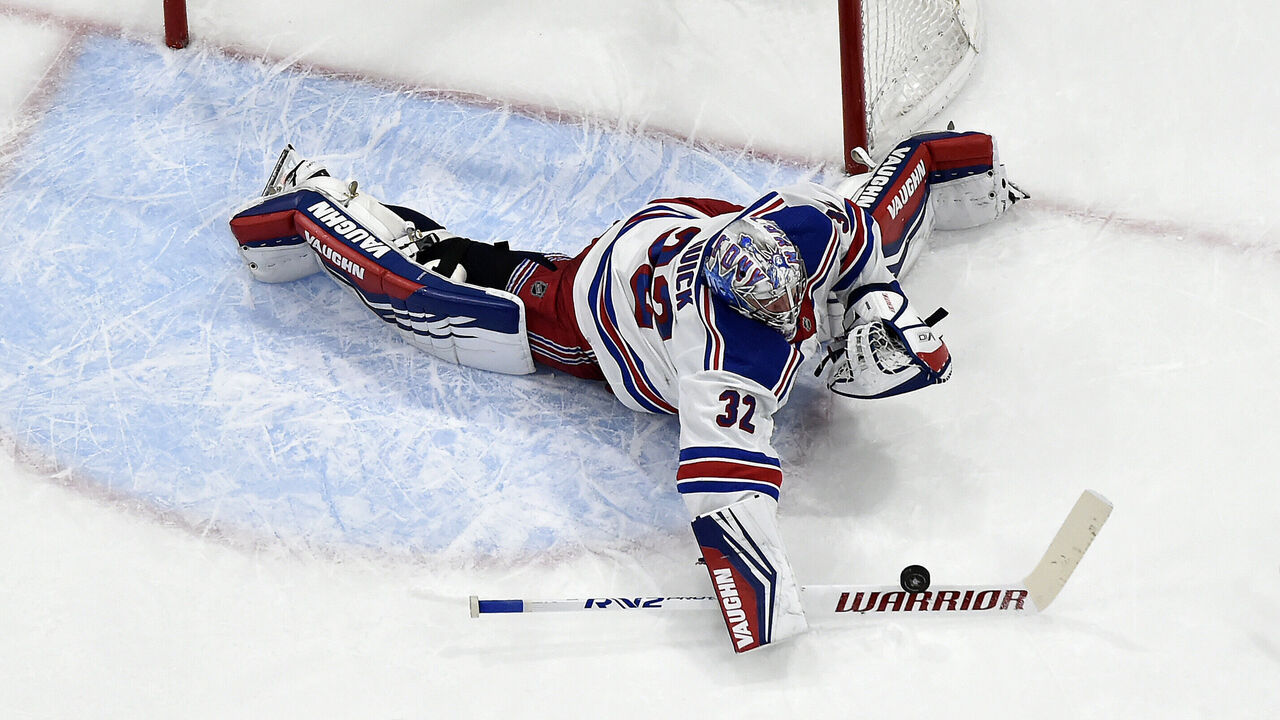 Eliot J. Schechter / Getty Images
Eliot J. Schechter / Getty ImagesQuick's playing deeper and much tighter to the goal line under the tutelage of Benoit Allaire, the Rangers' director of goaltending and a legend in goalie circles. In doing so, Quick's been less reliant on his trademark aggression and athleticism, letting the game come to him. Thus far, he's being beaten on the pass less frequently.
"Benoit is very big on simplifying a goalie's game. He's very big on being disciplined in your crease. Overall, he doesn't want his goalies to move all that much," said Rob Gherson, a pro goalie turned goalie coach who worked alongside Allaire in 2005-06 as a member of the AHL's Hartford Wolf Pack.
"And when you play deeper and stand your ground, the net disappears," Gherson said. "It's an illusion that messes with shooters' heads."
Gherson, a minor leaguer from 2004-09, explained how playing tighter to the goal line widens a goalie's margin of error. The position is about responding to what's unfolding in front of you. You can't be constantly chasing the puck.
Especially, in Quick's case, when your physical attributes have dwindled.
"For goalies who play aggressively, I think of them almost like baseball players with really long swings," he said. "When you're on, you're really good. But when something gets out of alignment, you really struggle. So, playing deeper and moving less - like Quick is doing in New York - means, naturally, fewer things can go wrong. Playing deeper makes everything more consistent."
Fantilli primed for big second half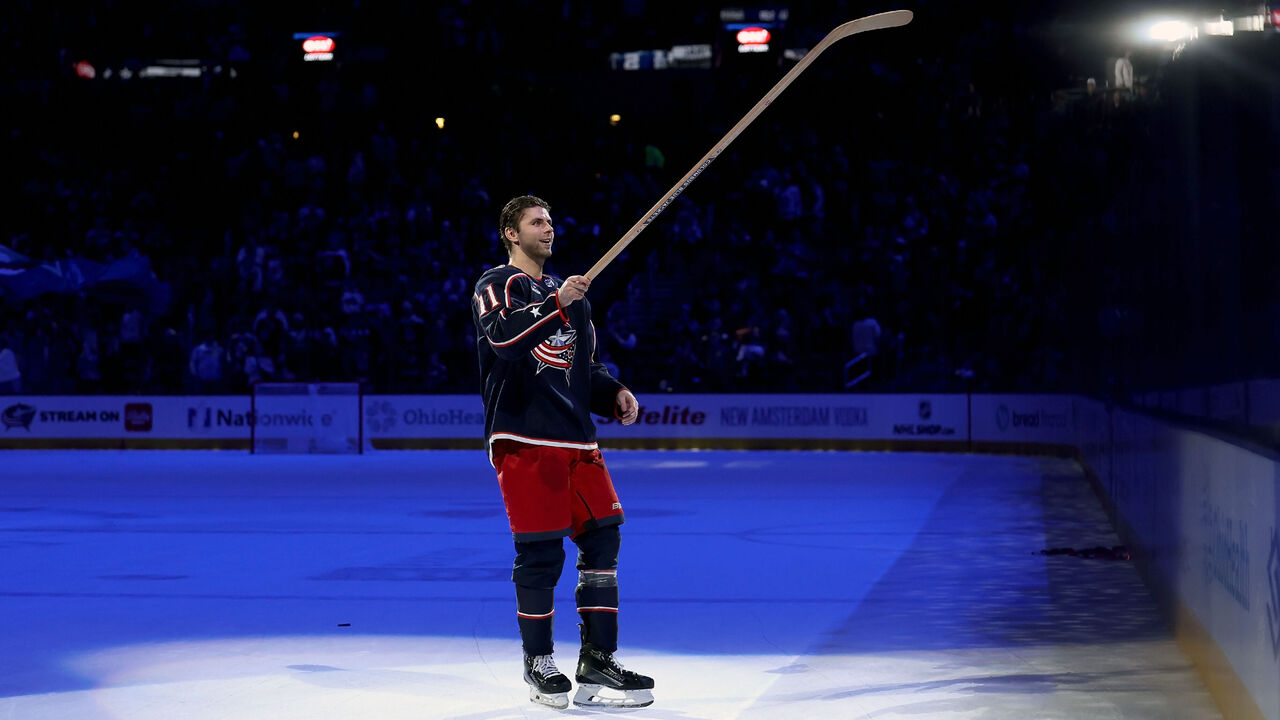 Kirk Irwin / Getty Images
Kirk Irwin / Getty ImagesThe early Calder Trophy conversation has been dominated by Blackhawks superstar Connor Bedard, who leads all rookies in goals, assists, and points. Sure, Brock Faber - the minute-munching defenseman for the Wild - has commanded some peripheral attention, but the debate's been pretty boring.
Watch for that to change in the second half thanks to Adam Fantilli.
Consider this: the Blue Jackets center was dealt a suboptimal hand to start his career. His first coach, Mike Babcock, was fired before training camp; Columbus has failed to meet expectations as a team; and, up until recently, his second coach, Pascal Vincent, had limited his usage and deployment.
The 13-19-8 Blue Jackets are still a mess. However, Fantilli has responded to Vincent taking the training wheels off by posting eight points in his past 10 games. His season total - 24 in 40 games - is first among rookies not named Bedard. Fantilli, 19, also trails only Bedard in goals (11), expected goals (10.8, according to Evolving Hockey), shots on goal (99), and shot attempts (209).
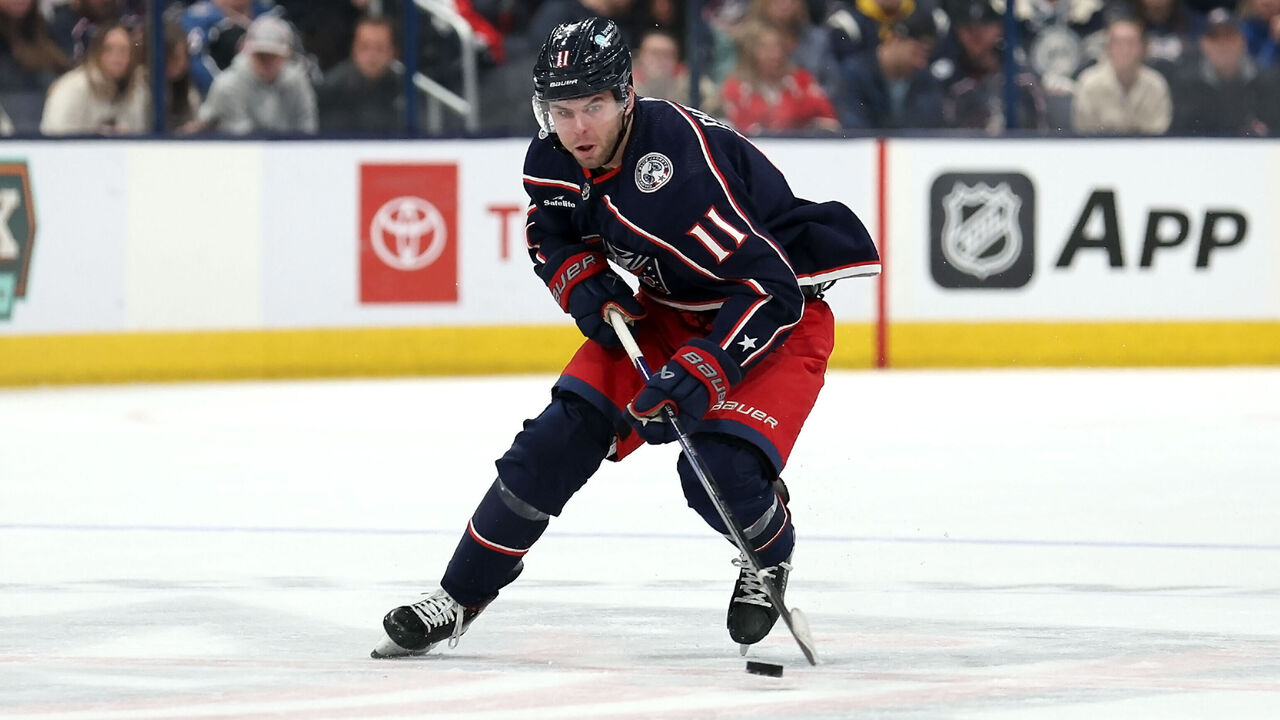 Kirk Irwin / Getty Images
Kirk Irwin / Getty ImagesThe Michigan product looked like a future franchise cornerstone as a prospect and has delivered early on. He's a full-package player with explosive skating, a lethal shot, defensive chops, an athletic build, and a physical edge. He's already established himself as an annoying forechecker and threat off the rush; his quickness is on full display every time he blazes through the neutral zone with the puck on his stick (which is often).
"The one thing we don't talk about enough is his mental strength," Vincent said prior to Columbus' mid-December win in Toronto. "He's a very mature young man and he's got this swagger about him. He's got this confidence."
"He's like a sponge," the coach added of Fantilli, who he doesn't envision hitting the so-called rookie wall. "He's really coachable. He's a big component of our future and our present right now. He's been adjusting really, really well."
Parting shotsJonathan Huberdeau: New season, new coach, same results. After posting 115 points in 80 games during his final season in Florida, Huberdeau has recorded just 72 points in 117 games in Calgary. (For context: that's the equivalent of 49 points in 80 games.) This season, the 30-year-old winger is 11th among Flames in points, and he's still poor defensively. It's truly shocking how quickly things have gone off the rails. The worst part is, Huberdeau's in Year 1 of an eight-year deal carrying a $10.5-million cap hit. Breaking even in a trade (Calgary would have to retain salary) appears virtually impossible, and the bonuses baked into his contract make a buyout pointless. The Huberdeau contract is the NHL's worst - and it isn't particularly close.
No points in December for Huberdeau so far, even though his two most frequent linemates have 17 pts combined.
- Kent Wilson (@Kent_Wilson) December 30, 2023
I'm sure the player came into the season thinking "Well at least it can't get any worse here". But it has.
Hurricanes circling: It took a while to get here, but the Hurricanes look like themselves again, which means order has been restored in the NHL. Carolina's underlying numbers are excellent, their special teams are strong, and their forecheck-heavy style is producing wins. Also in typical Canes fashion, Rod Brind'Amour's goalies can't stay healthy and the forward group needs at least one more finisher. A preseason favorite to contend for the President's Trophy and challenge for the Stanley Cup, 22-13-4 Carolina has lost only once in regulation in its past 12 games. The team is second in the Metropolitan Division and, with a second half packed with home dates, there's a chance it can catch up to the Rangers, who're currently five points ahead.
W!
- Walt Ruff (@WaltRuff) January 6, 2024
The #Canes score FIVE in the third, coming from behind to take a 6-2 victory over the Capitals.
That's now five wins in a row for the group.
What an ending! pic.twitter.com/8pK619zX1F
Righty-lefty data: Recently stumbled upon a research paper on handedness among NHLers. The most interesting finding from the paper (which has not been peer-reviewed by an academic journal) is that, on average, the United States produces far more right-handed shooters than Canada, Russia, and Europe. From 1967 to the present, righties have accounted for 46.7% of all American NHL forwards and defensemen compared to 37.4% of Canadian skaters, 25.7% of Russian skaters, and 25.3% of European skaters. "Clearly, there are (many) more players susceptible to shoot right when they are from the USA than when they are from anywhere else in the world," the study concludes. The authors speculate that the righty bias can be partly attributed to higher American participation in youth baseball, where righties rule the batter's box.
Is this the first right handed one in the NHL? Pretty sure we've only seen lefties thus far. https://t.co/K31bUpKgg7
- bo (@normalpostmaker) December 24, 2023
Takes, Thoughts, and Trends is theScore's biweekly hockey grab bag.
John Matisz is theScore's senior NHL writer. Follow John on Twitter (@MatiszJohn) or contact him via email (john.matisz@thescore.com).
Copyright (C) 2024 Score Media Ventures Inc. All rights reserved. Certain content reproduced under license.